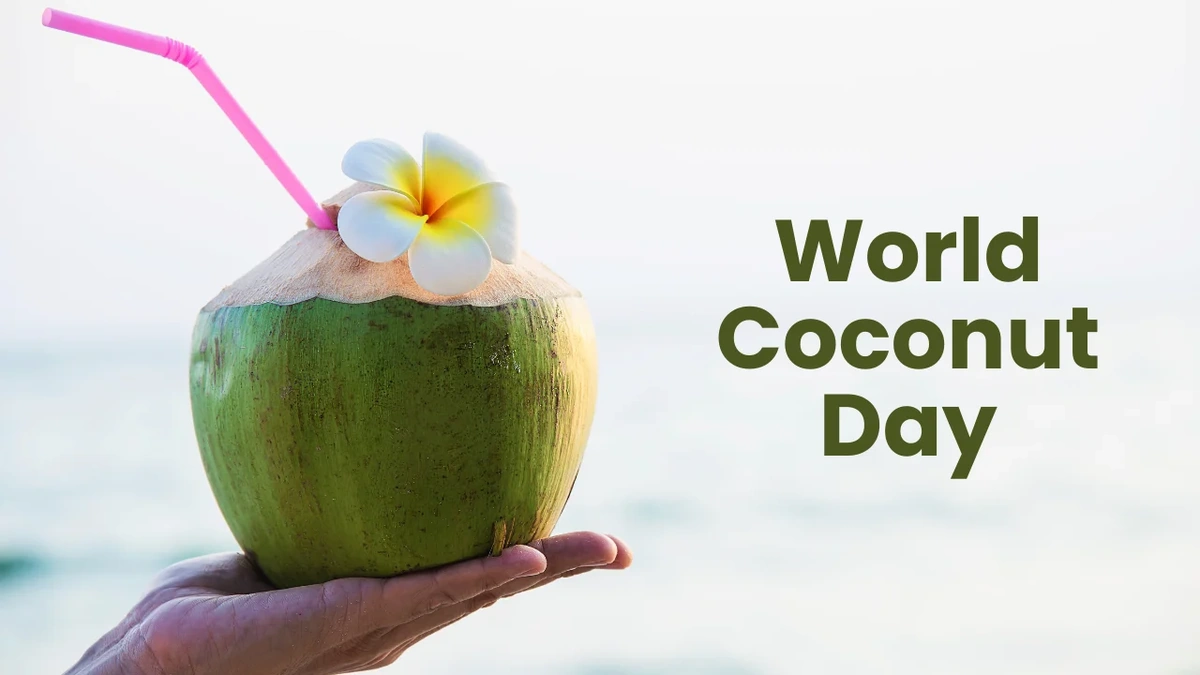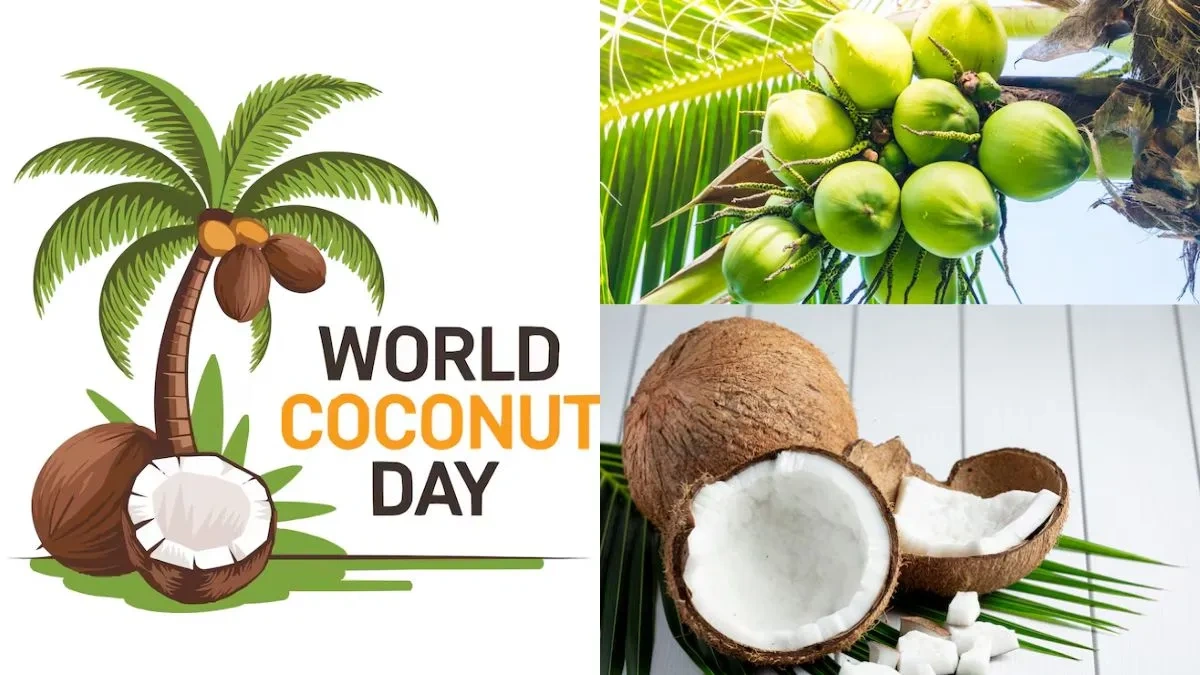World Coconut Day | More Than Just a Nutty Holiday
Okay, let’s be honest. When you first hear about World Coconut Day , you might think, “Seriously? A day for coconuts?” But here’s the thing: it’s not just about celebrating a tasty tropical fruit. It’s about understanding the profound impact the coconut industry has on livelihoods, economies, and even the environment, especially in countries like India. What fascinates me is how something so seemingly simple can have such far-reaching consequences. Did you know the coconut industry significantly contributes to the agricultural sector in India, providing livelihoods for millions?
The “Why” | Why World Coconut Day Matters to India

So, why should you, sitting in your cozy home in India, care about World Coconut Day celebrations ? Because the coconut isn’t just an ingredient in your favorite South Indian dishes or a refreshing drink on a hot day. It’s a cornerstone of many rural economies. Here’s the thing: India is one of the largest coconut producers in the world. World Coconut Day, celebrated annually on September 2nd, serves as a reminder of the importance of this versatile fruit. This day isn’t just a pat on the back; it’s a strategic moment to evaluate progress, address challenges, and set new goals for a more sustainable and prosperous coconut industry. I initially thought it was just another random holiday, but then I realized the depth of its significance.
Let’s be honest – The Coconut Development Board (CDB) , plays a vital role. They initiate programs focused on improving coconut cultivation, processing, and marketing. They are essential for the industry’s success. Think of them as the unsung heroes working behind the scenes to ensure that farmers get a fair price and that the industry remains competitive. According to the CDB, the industry supports the livelihood of over 12 million people in India.
Navigating the Challenges | Pests, Climate Change, and Market Fluctuations
The coconut industry isn’t all sunshine and sandy beaches. It faces real challenges. Pests and diseases can decimate entire crops, climate change is causing unpredictable weather patterns, and market fluctuations can leave farmers struggling to make ends meet. These are the things that keep industry experts up at night. A common mistake I see is not acknowledging these issues. Here’s how they hit the farmers:
- Pest and Disease Management: Implementing effective strategies to combat pests and diseases affecting coconut palms.
- Climate Resilience: Developing climate-resilient farming practices to mitigate the impact of climate change.
- Market Stability: Creating mechanisms to ensure fair prices and market stability for coconut farmers.
The government is taking some steps to address these challenges, implementing schemes and initiatives to support farmers and promote sustainable practices. But, let’s be real, more needs to be done. The sustainability of the coconut industry is intricately linked to the well-being of countless families. So, when we celebrate World Coconut Day 2024 , we are recognizing the ongoing effort to build a more resilient and equitable future for these communities.
The “How” | Supporting Sustainable Coconut Farming
So, how can you, as an individual, contribute to a more sustainable coconut industry? I’m glad you asked! You don’t need to be a farmer or an industry expert to make a difference. Supporting businesses that prioritize sustainable and ethical sourcing is a great start. Here are some simple things you can do. Buying products that use responsibly sourced coconut oil can make a huge difference. Be conscious of where your products come from.
What fascinates me is the potential for innovation in the coconut industry. From developing new coconut-based products to utilizing coconut waste for biofuel production, the possibilities are endless. Supporting research and development in these areas can help unlock the full potential of the coconut and create new economic opportunities. The versatility of the coconut is truly astounding!
Beyond the Kernel | Coconut Byproducts and Their Potential
But, the coconut is not just about the water and the flesh. It’s about the coir, the shell, and the husk – all of which have immense potential. Coir, for instance, is used in everything from mattresses to erosion control. Coconut shells can be turned into activated carbon, a valuable material used in water filtration and other industrial applications. Even the husk can be used as a growing medium for plants. Pretty cool, right?
The one thing you absolutely must know – Maximizing the value of coconut byproducts can generate additional income for farmers and reduce waste. It’s a win-win situation. Thinking about all those discarded coconut shells as wasted resources is actually kind of sad! It’s time we tap into their hidden potential!
It’s not only about the value of byproducts, but also about the health benefits of coconut. Did you know that coconut oil is a rich source of medium-chain triglycerides (MCTs)? These fats are easily digested and can provide a quick source of energy. Many studies have shown that coconut oil can contribute to cardiovascular health, boost the immune system, and aid in weight management.
In this era of conscious consumerism, understanding the journey of the products we consume is imperative. Knowing about World Coconut Day gives us an opportunity to learn and support initiatives that foster sustainability, promote ethical practices, and contribute to the well-being of coconut-growing communities. It’s an invitation to be part of a larger narrative where every choice we make can ripple into positive change.
World Coconut Day | A Reminder of Interconnectedness
So, this coconut day celebration , take a moment to appreciate the humble coconut. It’s more than just a fruit; it’s a symbol of resilience, sustainability, and the interconnectedness of our world. Let’s raise a glass (of coconut water, perhaps?) to the farmers, the innovators, and everyone working to build a brighter future for the coconut industry. Let’s be honest, it tastes good too!
As per the guidelines, the industry is constantly evolving and one needs to stay updated to be ahead. There are many International Coconut Community (ICC) programs that help make the industry stronger and better.
FAQ About World Coconut Day
Why do we celebrate World Coconut Day?
We celebrate it to raise awareness about the importance of coconuts for livelihoods, economies, and sustainability.
When is World Coconut Day celebrated?
World Coconut Day is celebrated every year on September 2nd.
What is the role of the Coconut Development Board (CDB)?
The CDB promotes coconut cultivation, processing, and marketing in India.
How can I support sustainable coconut farming?
Support businesses that prioritize sustainable and ethical sourcing of coconut products.
What are the major challenges facing the coconut industry?
Major challenges include pests, climate change, and market fluctuations.
What are some potential uses for coconut byproducts?
Coconut byproducts can be used in mattresses, water filtration, and as a growing medium for plants.













